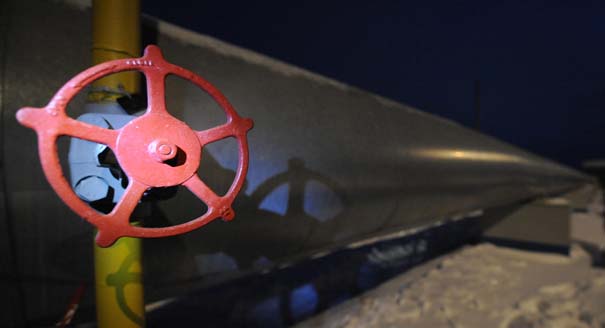How should the EU deal with Russia? That basic question, or variations of it, dominated the debate at this year’s Snow Meeting in Trakai, Lithuania. The event, the first in the year’s international political conference circuit, has become a high-level exchange among foreign ministers, parliamentarians, diplomats, and analysts, including a good chunk of guests from the United States. Their suggestion for how to handle Russia? Exploit its energy dependence.
Everyone came to Lithuania still shell-shocked after the EU’s recent failure—as most people saw it—in its power struggle with Russia for influence in Europe’s Eastern neighborhood.
Interpretations varied greatly of what had actually gone wrong in the run-up to the EU’s Eastern Partnership summit in Vilnius last November, and to what extent the EU should blame itself for its failure to make Ukraine a closer partner. But one thing was undisputed: that the West needs a tougher position on Russia.
True, in transatlantic circles, Russia’s reputation has never really been the best, and hawkish anti-Russian elements have always existed in the debate. At the Snow Meeting, Central Europeans especially hinted repeatedly at Russia’s intransigence and bullying tactics.
But it is very clear that during Russian President Vladimir Putin’s current administration, there are few real defenders of Russia left at international gatherings of this kind. Even Kremlin apologists, with the exception of a few diehards, have run out of ammunition in light of Russia’s recent domestic and international political record.
The big question is what should follow this near-universal indignation. The international community will need Russia in the near future on all kinds of issues, from Syria to weapons of mass destruction, from Afghanistan to Iran. Somehow, diplomacy with Moscow must go on.
The EU holds two bilateral summits with Russia a year, and the United States holds one. What can the West put on the agenda of those meetings to make it clear that a limit has been reached, while still maintaining a working relationship with the Kremlin? How can the West play hardball with Russia without becoming the mirror image of the opponent to which it feels morally superior?
During the debates in Trakai, participants discussed an impressive catalogue of measures. They hailed the boycott by leading Western politicians of next month’s Winter Olympics in the Russian city of Sochi. They praised U.S. President Barack Obama’s decision not to attend a planned U.S.-Russia summit last September.
As Russia was so eager to be acknowledged as a great power on a par with the United States, why not systematically deny it that acknowledgment? Russian membership in the Organization for Economic Cooperation and Development, a rich-country think tank, could be withheld. And the World Trade Organization should sanction Russia more severely for its violations of the body’s rules.
What is more, conference delegates asked, why should Russia be a member of the G8 when it is neither a democracy nor a particularly impressive economic player? A country that systematically applies economic pressure to blackmail Ukraine and other neighbors in Eastern Europe and Central Asia should not enjoy a seat at the table of the most prestigious club of global economic players. Certainly, a boycott by world leaders of June’s G8 summit during the Russian presidency would be a painful blow to the status-hungry players in Moscow.
For other Russia critics, this was all just cheap symbolism that did not amount to enough of a penalty for all of Russia’s bullying, threats, and blackmail. Those sterner detractors demanded a much more strategic approach to countering Russian policies. Their suggestion was that there is really only one Achilles’ heel in Russia’s tough political posture: its utter dependence on energy exports. Hit that weak spot, and the power equation would start to change.
That is a valid point. There are already at least five energy trends that players in the Kremlin are watching with great concern.
First, the U.S. shale gas revolution has led to a decrease in international demand for natural gas from conventional sources. Central European participants in Trakai argued vehemently for making U.S. gas available in the European market as soon as possible, thereby hurting Russia’s dominant role as a gas supplier in that decisive region.
Second, the EU’s Third Energy Package, which is designed to create a single EU energy market, would make market domination by one player less likely.
Third, the EU has launched an antitrust case against Russian energy giant Gazprom over the company’s monopolistic pricing policies vis-à-vis its European customers.
Fourth, the government in Berlin is continuing to roll out its Energiewende, its ambitious long-term plan to switch German energy consumption from mainly fossil fuels and nuclear sources to renewables.
And fifth, Europeans are eager to redesign the continental gas grid to allow gas to be redirected from west to east. That way, shortages imposed by Russia in Central in Eastern Europe could be at least partly compensated by other sources, reducing Moscow’s political influence in the region.
None of these trends, even if driven forward decisively, would give the EU immediate leverage. But they pose a formidable long-term threat to Russia’s power to influence its Western flank politically. If combined with meaningful diplomatic symbolism, energy leverage could allow Europe to demonstrate that it is willing to speak the language of force that Moscow understands so well.





.jpg)
